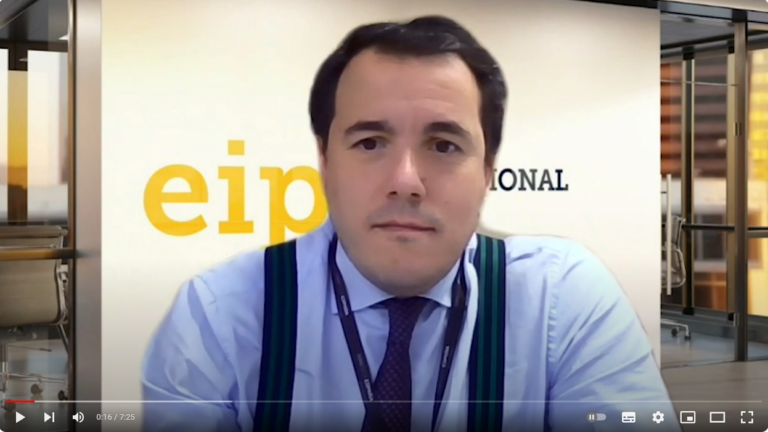Thanks to this new alliance, the students of the Professional Master's Degree in Cybersecurity Management, Ethical Hacking and Offensive Security will be able to obtain the CCSP certification upon completing their training in EIP
The certification Certified Cyber Security Professional (CCSP), issued by ISMS Forum, is the first badge that accredits cybersecurity professionals with a high level of specialization. Usually, to obtain it, it is necessary to pass a theoretical test and prove at least 3 years of experience in the sector. Thanks to a new agreement between EIP International Business School and ISMS Forum, the School's students will be able to obtain the CCSP certification by completing the Professional Master in Cybersecurity Management, Ethical Hacking and Offensive Security, without the need to take the CCSP exam or prove experience.
ISMS Forum is certain that passing the EIP Master is equivalent to achieving the CCSP certification through its usual access routes, thanks to a fully updated syllabus that is constantly being reviewed, an eminently practical methodology and a stellar teaching team.
To learn more about this initiative, we have interviewed Sergio Padilla, director of the EIP Cybersecurity Chair, professor of the Master and also CISO at an important entity in the financial sector at the national level:
Sergio, tell us what this new agreement that you have closed from the EIP Cybersecurity Chair with ISMS Forum consists of:
This is an agreement that we had been looking for for a long time between the school and ISMS Forum, which is the Spanish Association for the Promotion of Information Security. The Forum is a non-profit organization founded in 2007 to promote the development, knowledge and culture of information security in Spain, and acts for the benefit of the entire community involved in the sector.
To give you an idea, there are more than 250 associated companies and more than 1,250 associated professionals. It is a very active association at a professional level within the world of cybersecurity in Spain.
The agreement consists of making a certification as relevant as the CCSP accessible to students who complete our Cybersecurity master's degree.
How does the resume of a cybersecurity professional who has the CCSP badge change versus someone who does not?
This certification, like all training and like the rest of the certifications that we include in the Professional Master in Cybersecurity Management, Ethical Hacking and Offensive Security, is going to be very important in the resume of any professional. First, because it increases and accredits their knowledge, but also because it speaks of their capacity for innovation, their desire to improve.
Furthermore, when you are starting out in the world of cybersecurity, this certification is a way to highlight that you want to work here, it is a declaration of intent.
On the other hand, for those professionals who were already in cybersecurity, given that at EIP we have both types of students, this certification also helps them train for new positions, higher positions or access different companies.
Within the framework of this collaboration, what does an EIP student have to do to get their badge?
Pass the Master. As simple as that. Once a student can demonstrate having completed the Professional Master's Degree in Cybersecurity Management, Ethical Hacking and Offensive Security, through EIP, they can contact ISMS Forum and carry out the relevant procedures to directly obtain the certification, without going through the exam. .
Putting ourselves in the role of a recruiter looking for talent within the area of cybersecurity, what capabilities does CCSP certify?
The CCSP certification, specifically, was created with the objective of being a certification aimed at professionals in the cybersecurity government practice, and obtaining the certification accredits a high level of specialization in cybersecurity.
I believe that information has become one of the assets that every company has to protect and safeguard against an environment of very high threats against the confidentiality, integrity and availability of information. A cybersecurity professional must know how to properly manage, with or for your company, information security. It is about being able to minimize the threats to which this information is exposed.
The capabilities certified by this badge and business needs are fully aligned. The business community needs cybersecurity professionals who, logically, have the appropriate knowledge and skills to minimize the risks to which organizations' information is exposed.
For anyone who may be watching us and wants to start their career in the world of cybersecurity or wants to take a qualitative leap in their employment within the field of cybersecurity. What would you recommend to them?
There are many things that we could recommend from my experience, but the main one is clearly training, it is logical. Cybersecurity is a very broad field in which many professionals are needed for many very different areas within the same sector.
You have to be clear in which areas of cybersecurity you are going to work on, but that is not always known from the beginning. There is usually a lot of ignorance when someone approaches cybersecurity for the first time or when someone who is already in cybersecurity wants to explore other areas.
Continuing with the recommendation, our master's degree will allow that person who is approaching cybersecurity for the first time, or who is already in a specific area, to have a very global, very broad, as well as detailed, vision of the entire field of cybersecurity.
This recommendation to train, whether with our master's degree or other certifications, is the main message I can send. Furthermore, we must keep in mind that cybersecurity is a very, very changing field. Threats and technological evolutions are also threats, which is why training is essential. My advice is to always stay very up to date.


































